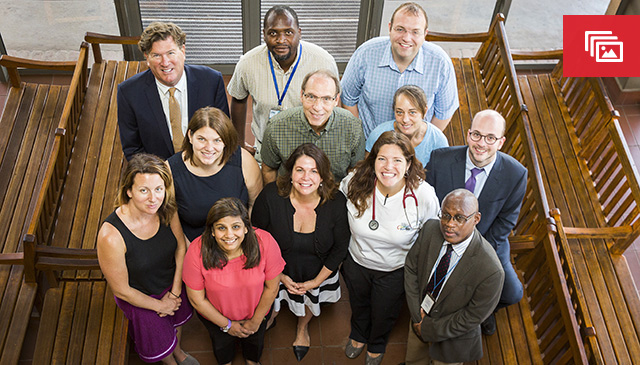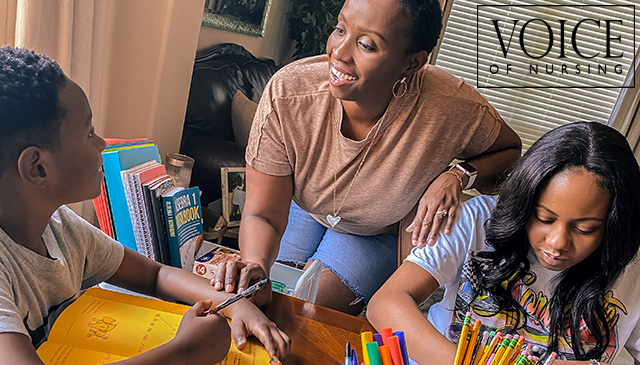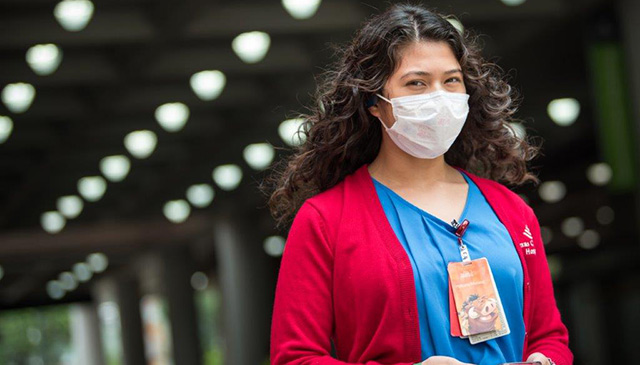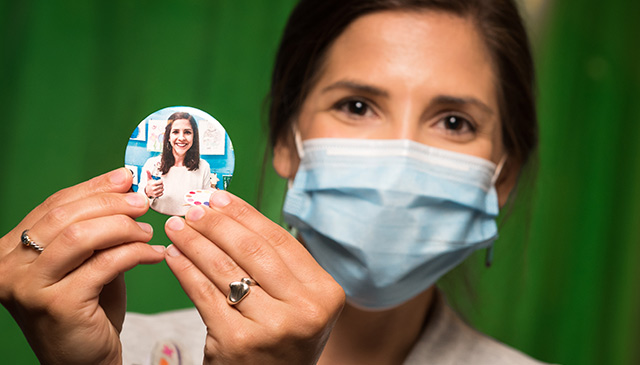
Texas Children’s medical staff is sharing a collection of wellness tips covering a variety of topics in hopes it will help those working so hard for our patients and families during the pandemic. Read more

Texas Children’s medical staff is sharing a collection of wellness tips covering a variety of topics in hopes it will help those working so hard for our patients and families during the pandemic. Read more

You are not alone
The following passage was written by Texas Children’s Chaplain James Denham.
I watched a mother hold her baby for the first time last week, after some time waiting for this moment. It was absolutely mesmerizing and stirred something deep in my soul. Have you ever had something take your breath away and stop you in your tracks? I hope so. It’s kind of beyond words.
Let me tell why this particular circumstance was so amazing to me. This mother, courageous and resilient, held her son and spoke to him words he had never heard – “No tenga miedo. (Don’t be afraid). No tenga miedo. (Don’t be afraid). Estoy aquí. (I am here little one.).” Wow! Her grip on her child was firm and the look, the maternal strength she imparted through her stare, spoke volumes. Even as I write this, I have goosebumps and am misty eyed because it is so beautiful. As a parent, I longed to speak those words to my son and for my mom to speak them to me as soon as possible.
They mean even more to me this week. A pandemic with a novel virus, a society desperate for equality and justice, a heated presidential election, and now two tropical storms in the Gulf of Mexico? Yes, this mother’s words ring true: “So not be afraid. I am here with you.”
Who is here with us? Why should we not afraid? For many, the answer to both of these questions lies in our spirituality and the profound grounding of faith in a God or love or something sacred that tells us fear is not our first response, although it is normal. That spirituality tells us to lean in with courage to that which is greater than us, yet often intangible. Namely, peace, or love, or God’s presence, or hope found in our common humanity, or the transcendence of nature. We may feel worried, but these things ground us in the face of hard things and speak to us, “Don’t be afraid, you are not alone.”
Also, we have each other. Just as this mother held her baby and spoke with the one voice her son knew best, we hear the voices of many we love whose presence instills the truth, which is that they are here. Our parents, our children, our faith communities, our coworkers, our families, our mentors – all of them stand holding us speaking profoundly, don’t be afraid for I am walking with you. They wear masks with us. They listen to us. They wade through rains with us. They calm our anxieties. They order food for us. They pray with us. They dive through research for us. They are here with us. They are like a mother holding her baby, guiding him through the hard and long times, saying “Don’t be afraid. I am here with you.”
Know that you are that presence to me. Know that you are that presence to others. Hold on and hold each other. We will make it together.

Baylor College of Medicine International Pediatric AIDS Initiative (BIPAI) at Texas Children’s Hospital lost one of its founding members August 11 with the passing of Dr. Peter Nicholas Kazembe. He was the founding executive director of Baylor-Malawi and served as director until his retirement in 2018.
Kazembe, often considered the “grandfather of pediatrics” in Malawi, made monumental contributions to the health of children and families in Malawi and beyond over his decades-long career. He was instrumental in the development of pediatrics as a specialty in Malawi. His collaborations and mentorship impacted the careers of thousands of doctors and health professionals, who now provide stellar pediatric care throughout Africa and beyond.
“Dr. Kazembe was a dedicated husband, father, leader, advocate, mentor, clinician educator, teacher and friend,” said Michael Mizwa, BIPAI chief executive officer. “I’m deeply saddened by his loss but know his legacy will live on in the work of many.”
Click here to listen to some of Kazembe’s colleagues talk about his loss and the significant contributions he made to pediatric health care in Malawi.
Kazembe’s legacy includes pioneering Malawi’s pediatric HIV/AIDS care, treatment and prevention programming; developing the country’s first HIV treatment guidelines; providing mentorship and education to countless health professionals; and collaboration with pediatricians and child health advocates all over the world.
Under his leadership, Baylor College of Medicine Children’s Foundation-Malawi in a public private partnership with the Government of Malawi and Abbott Fund, built and operated the first stand-alone pediatric HIV clinic in Malawi and was the first non-government organization to provide antiretroviral therapy for children in Malawi, fast becoming the country’s largest provider of pediatric HIV care.
“The work and leadership of Dr. Kazembe has saved countless lives,” said Phoebe Nyasulu, executive director of BIPAI’s Center of Excellence (COE) in Malawi. “Without him, we wouldn’t be where we are today.”
Kazembe’s contributions span clinical care, research, advocacy, policy, and education – and cross pediatric HIV, tuberculosis, malaria, neonatology, maternal and child health. Throughout his career, he developed long-lasting partnerships and deep friendships around the world that have blossomed and prospered and will continue to benefit the people of Malawi for decades to come.
“Dr. Kazembe was instrumental in the start of every single Texas Children’s global health program in Malawi,” said Dr. Susan Torrey, vice chair of the Global Health Steering Committee. “His leadership and vision have enabled Texas Children’s to expand care in Malawi to include cancer, cardiology, surgery, maternal health and emergency medicine, his support of which was instrumental in the successful emergency medicine collaboration between Texas Children’s and other organizations.”
Dr. Jeff Wilkinson, vice chair of Global Women’s Health with Baylor College of Medicine and director of Texas Children’s Global Women’s Health Program, said the impact Dr. Kazembe made during his lifetime on the people of Malawi, especially mothers and children, is invaluable.
“Pediatric and maternal care has advanced by leaps and bounds because of Dr. Kazembe’s efforts,” Wilkinson said, adding that more than 6,000 babies are now born each year at Area 25 Health Center, a public-private partnership between Baylor, Texas Children’s and the Malawi Ministry of Health. “The impact of his knowledge and dedication to pediatric and maternal health care will be felt for generations to come.”
In honor of Kazembe’s work, he will be posthumously awarded the American Academy of Pediatrics 2020 Hillman-Olness Award for lifetime service and lasting contributions to global child health. The award will be presented on October 5.
Established in 2011 in honor of the late Liz Hillman, the late Donald Hillman, and Karen Olness, the award recognizes individuals who have devoted their careers to advancing global child health. Among the numerous enduring legacies from Kazembe’s expansive career are the long-standing international and inter-institutional partnerships and collaborations that he forged, all of which continue to benefit the people of Malawi.
His collaborations and mentorship undoubtedly impacted the careers of thousands of doctors and health professionals, including numerous Fellows of the American Academy of Pediatrics (FAAPs), who now provides stellar pediatric care all over Africa and the United States.
Ministry of Health Principal Secretary Dr. Charles Mwansambo said in The Nation, Malawi’s leading newspaper, that he will miss Kazembe at both national and personal levels.
“At a time when many Malawian doctors studying abroad, especially specialists, were opting to stay abroad and make money for themselves, Peter returned home to serve and save what he knew best: the children and his own countrymen. He was a passionate and selfless man.”
Anna Mandalakas, director of Texas Children’s Global Tuberculosis Program, said she is extremely fortunate to have known Kazembe and to have learned from the work he did that changed the lives of so many.
“I have been inspired not only by his work but by the kind, compassionate, and humorous person that he was,” Mandalakas said. “I have smiled so much thinking about him these past days.”

As a new school year begins, Denise Tanner-Brown shares helpful tips to prepare parents and children for virtual learning at home during COVID-19. Read more

As children across Texas head back to school this month and next, Texas Children’s is preparing for a potential spike in COVID-19 cases. Although it is unclear what will happen when kids return to class, there is a chance that more people will contract COVID-19 due to increased exposure to the virus.
Denise Tanner-Brown, assistant vice president of Community and Ambulatory Nursing, said she is cautiously optimistic considering many schools are starting back virtually, but that no one knows what the next step might be and how that will affect the situation.
“We are standing ready for a second wave of cases and are not letting down our guard,” Tanner-Brown said. “As patient volumes decrease, we have a deactivation strategy where we can temporarily close down units. But, we also have an activation strategy in place where we can turn it back on really quickly should the situation change.”
Critical Care Director of Nursing Shannon Zerber said one of the things Texas Children’s has done well throughout the pandemic that’s reduced the stress of potential surges is adequate planning for space and staff.
A team of experts from across the organization has a tri-campus multitier plan that lays out multiple levels of response. The plan starts with sending patients to the Special Isolation Unit at Texas Children’s Hospital West Campus. Additional beds dedicated to COVID-19 patients are designated at Texas Children’s Hospital in the Medical Center Main Campus, including 13 acute care beds, and six additional ICU beds.
“As our COVID-19 volumes change at Texas Children’s, in Houston and the region, we adapt and flex to demand,” Zerber said. “There is a patient placement group that meets routinely to look at the latest data, so we are ahead of things, not behind. We are anticipating what will happen next.” As a result, Zerber said “everyone is prepared for a spike when school goes back, especially face to face. We all hope it won’t happen but we are ready if it does.”
Dr. Amy Arrington, medical director of the SIU, said the biggest surge Texas Children’s has seen so far was at the end of June and the beginning of July. During that time, all 18 beds in the dedicated biocontainment unit were full and patients were also being cared for at the Medical Center campus.
Since then, the number of COVID-19 patients has dropped, but there has been an increase in the number of patients with multi-system inflammatory syndrome (MIS-C), a delayed inflammatory response to COVID-19 that typically presents four to six weeks after exposure. The syndrome is typically seen in children and teenagers and has varying effects on vital organs, including the heart. Arrington said although the condition is rare, clinicians across the nation are seeing an uptick in cases and that this trend could continue as more children head back to school and are potentially exposed to and contract COVID-19.
Caring for patients with MIS-C takes a tremendous amount of resources and expertise as many patients require stays in the intensive care unit, some of whom need specialized treatment such as extracorporeal membrane oxygenation (ECMO), a treatment that uses a pump to circulate blood through an artificial lung back into the bloodstream.
Texas Children’s has the resources and the expertise to care for these patients. We have intensive care specialists, cardiologists, surgeons, and specialists in rheumatology, infectious diseases and immunology investigating and treating the children as aggressively as needed to ensure they have the best possible outcome.
Chief of Critical Care Dr. Lara Shekerdemian, who has been directly involved in the organization of the intensive care of the 30 plus MIS-C cases at Texas Children’s throughout the pandemic, said Texas Children’s has the capacity to handle a surge of these patients even if it means using areas that aren’t currently being used. Although she said it is unlikely we will see an exponential growth in the number of cases of MIS-C, Shekerdemian emphasized that the capacity is there to care for all those who need the specialized care Texas Children’s can provide.
Arrington agreed and said “So far, space and staffing have never been an issue due to adequate planning and dedicated staff willing to show up for countless extra shifts, work as a unified team and generally go above and beyond. But, we must remain vigilant in our prevention and safety measures.”
Dr. Judith Campbell, medical director of Infection Control and Prevention, added that clinicians at Texas Children’s and other medical institutions from across the world are in a much better position to care for COVID-19 and MIS-C patients than they were in March when the pandemic began.
“We have good evidence now about how to care for patients safely,” Campbell said. “We also have a better supply of personal protective equipment, which makes clinicians and staff feel safer when they are caring for a positive patient.”
Staying on top of the latest research, looking at where we can do better and remaining steadfast in our dedication to our safety measures and protocols, however, are key to our continued success, Campbell said, adding that there is no room to lessen our determination in this pandemic.
Texas Children’s remains committed to providing the safest environment for our patients, families and employees. Since the beginning of the pandemic, we have done an excellent job at keeping people safe while continuing to be there for our patients and deliver top notch care.
Three safety measures that have been implemented across our system and that work very well revolve around screening, social distancing and wearing the proper personal protective equipment. We are constantly adapting and improving these efforts as the situation progresses and changes, but believe we have established a good foundational practice that will be part of our organization for some time to come.
As a reminder, everyone who walks into one of our facilities is stopped and screened for symptoms of COVID-19. Patients, family members and employees alike must fill out a questionnaire about any current symptoms they might have and any recent trips they might have taken. The screening process also includes a temperature check. Months ago, we invested in thermal imaging cameras at our three hospitals to expedite the process and to make it safer for our employees who are administering the screenings.
When on our campus or in any of our facilities, we ask patients, family members and even our own employees to please keep a safe distance of approximately 6 feet from others whenever and wherever possible, including waiting in line and riding in our elevators. We have placed signs and stickers across the system to help keep social distancing top of mind.
Wearing a mask is a must if you want to visit one of our facilities. Patients, family members, visitors and employees are issued a hospital-grade mask after being screened at one of our screening stations. Providers working in certain areas of our system wear additional PPE such as an N-95 mask, a procedure mask, goggles and/or an isolation gown depending on their risk level.
We also have instituted visitor restrictions, video and drive-through visits, precheck-in and online appointment and payment via MyChart, and curbside pharmacy pickup to mitigate any potential exposure to COVID-19 and to alleviate people’s worries about coming to one of our facilities for care.
We have robust testing capabilities and the nation’s largest pediatric primary care network in the nation standing on the front lines of this pandemic triaging patients who might have the virus and helping care for those who do. Texas Children’s Pediatrics is also helping administer COVID-19 tests at our testing sites across the organization and they are continuing to administer much-needed wellness visits and routine vaccines, including the flu vaccine, which will be more than ever for people to receive.
“We have been thoughtful and careful in our planning so that we can turn on a dime if we need to,” said Texas Children’s Pediatrics President Kay Tittle. “Throughout this pandemic, we have figured out how to be more flexible to meet the needs of our families. This will continue to be key in order for us to stay the course and to face whatever comes next.”
Shekerdemian said testing will be extremely important when school opens in order to slow the spread of the virus. It is imperative, she said, that people are honest with themselves and others when they don’t feel well.
“Don’t brush things aside,” Shekerdemian said. “If you (or your family member) don’t feel well, then call your physician and if necessary, isolate yourself and get a test.”
Campbell agreed and said the fall will definitely present an interesting chapter in the story of COVID-19 as it overlays other virial infections that occur commonly in the fall and winter months.

Texas Children’s continues to work hard with our vendor and community partners to implement new programs and opportunities to help lessen disruptions to our team members. As a reminder, check out this guide, which includes information on various topics related to schooling such as discounts, child care, distance learning and much more. Read more

The Child Life team has created buttons personalized with employees’ faces to wear during their shifts. The “face buttons” are intended to help put patients at ease, as they give them a glimpse of the smiling Texas Children’s face beneath the mask and other PPE. The Volunteer Services team is extending this unique and thoughtful effort to all employees and medical staff by hosting “Create your own Face Button” events across the Medical Center Campus next week, with the goal of expanding to other locations soon. Bring your own photo to fit in a 2.5” round button, or come camera ready so your photo can be taken and printed on the spot!
Create your own face button event dates:
Tuesday, August 18
Wednesday, August 19
Thursday, August 20